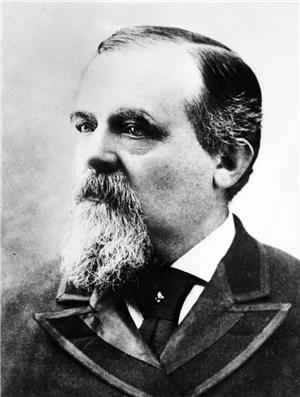On July 10, 1882, Republican Henry G. Struve (1836-1905) is elected mayor of Seattle.
Struve, a German immigrant, was a lawyer, journalist, and businessman who played a key role in Seattle's political, social, and economic life in the 1880s and 1890s. He served two terms as mayor, overseeing more than $500,000 in public improvements, including the grading of the streets. He was a regent of the Washington University (predecessor of the University of Washington), a charter member of the Rainier Club, and an organizer of the city's cable car system. He helped write a new city charter for Seattle in 1890. He also served as judge advocate general of Washington Territory.
Historian Clarence B. Bagley, one of Struve's contemporaries, described him as a man whose "connection with any enterprise or project assured its success through his individual efforts, for in his vocabulary there was no such word as failure." (Bagley, Vol. 2, p. 752).
Struve was 16 years old when he emigrated to America from Oldenburg, Germany. He spent six years in California, where he studied law, worked on several newspapers, and also dabbled in mining. He was admitted to the bar in 1859. He moved to Vancouver, Washington, that year, and bought the Vancouver Chronicle, which he published for a year. In 1862, he was elected district attorney for the second judicial district, in Clark County, serving four terms altogether. He resigned in 1869, when he was elected Clark County probate judge.
Struve was deeply involved in state politics during the 1860s and 1870s, as a member of the state legislative assembly, the legislative council, and numerous legislative committees. He moved to Olympia in 1871, where he briefly owned the Puget Sound Daily Courier. He sold the paper before the end of the year, when President Ulysses Grant appointed him secretary of Washington Territory. He held that office until the end of Grant's administration in 1877.
After moving to Seattle in 1879, Struve established a private law practice with attorney John Leary. Among his more notable clients was the Northern Pacific Railroad Company. He was the chief litigator for the company in Washington state until 1883.
In Seattle, Struve's activities "extended to almost every field which had to do with the upbuilding of city and state," according to Bagley (Vol. 2, p. 751). He was appointed a university regent shortly after moving to the city and served as president of the board of regents for four consecutive terms. He was elected director of the public schools in 1884, holding that position for three years.
As advocate general of Washington Territory in 1886, he helped direct military affairs during the period of martial law that was imposed in Seattle after an anti-Chinese riot in February of that year.
Struve's business interests included the system in Seattle. He was a major stockholder in the company that built a line from the Madison Valley to downtown Seattle. He also invested in several insurance companies and banks, often serving as an officer as well as a stockholder.
In addition to his business and professional activities, he was involved with numerous clubs and fraternal societies. He was a founder of the grand lodge of Odd Fellows in Washington, an organizer of the Seattle Chamber of Commerce, and a charter member of the Rainier Club (a private men's club in Seattle, limited to the city's wealthiest and most prominent citizens).
He and his wife, Lascelle, had four children, one of whom, Frederick K. Struve, became a leading financier in Seattle. Henry Struve died unexpectedly, after a short illness, while on a trip to New York in 1905. He was a man who "gathered to himself the rewards of a well spent life," Bagley commented, "but, more than that, he upheld the political and legal status of the community and contributed to its intellectual and moral stability" (Vol. 2, p. 753).

